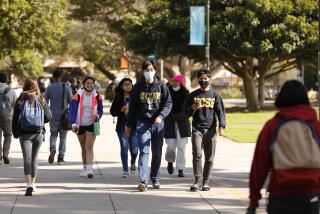Huttenback Still Collecting Pay at Santa Barbara
SANTA BARBARA — Ten months after being convicted of embezzling about $250,000 in campus funds to renovate his private home, former UC Santa Barbara Chancellor Robert Huttenback is still being paid about $6,800 a month by the university.
Huttenback was suspended indefinitely last September from his post as a tenured professor in the history department, and a campus discipline review process was initiated to determine his future. Almost an entire school year later, no decision has been made, and Huttenback continues to draw his salary.
Many professors and students have expressed outrage that the university Huttenback embezzled funds from should continue to pay his salary. And, they say, during a period of budget cutbacks on campus, Huttenback’s $81,700-a-year salary is sorely needed for other campus programs.
“This year there are 2,400 freshmen who are unable to take required freshman English courses because the university is too short of money to provide those courses,” said John Reiff, who teaches freshman composition. “So it’s terribly puzzling and distressing to pay a convicted felon for not teaching.”
After Huttenback was suspended, a faculty committee, following campus regulations, began reviewing his case in order to make a recommendation to Chancellor Barbara Uehling.
Huttenback’s suspension at full pay “was not an arbitrary matter,” said John Myers, chairman of the five-member Committee of Privilege and Tenure. All suspended professors, according to the faculty code of conduct, he said, must be given full pay while their future is determined.
The committee has not yet made a recommendation to the chancellor, he said, because “this is a very complicated matter that has to be done with a great deal of thought. A person’s reputation and livelihood are at stake. Something like this has to be done carefully with due regard to all parties.”
But other faculty members said a decision should have been made long ago.
“There’s no way to defend this kind of foot-dragging. . . ,” said Thomas Harding, a professor of anthropology. “The university should at least hold his salary in escrow until this whole thing’s resolved. . . .
“I have a friend who’s a member of a tennis club in town, and whenever he sees Huttenback playing tennis he’s furious. Huttenback’s getting paid and all he’s doing is playing tennis.”
A number of faculty members and students say the university has a responsibility to resolve the matter quickly.
“This is not the kind of example the university should be setting for young people,” said Gerald Horne, chairman of the black studies department. “Students read about Watergate and the Teapot Dome scandal in their classes. So when they see $81,000 handed out to a person involved in another scandal, it sends the wrong message to them. This kind of thing breeds cynicism.”
Huttenback resigned as chancellor in July, 1986, after controversy erupted over his expenditures on his home, but he continued to teach history at the university.
He was later convicted of embezzlement and income tax evasion in connection with the funds spent on his home, but was spared a prison sentence. He was ordered to pay a $60,000 fine, serve five years’ probation and perform 1,000 hours of community service.
Huttenback, who is appealing his conviction, still faces several levels of review before his future at the university is determined. Even if the faculty committee decides that Huttenback should be demoted or dismissed and Chancellor Uehling accepts the committee’s recommendation, the University of California regents must make the final decision on Huttenback’s teaching future.
Javier LaFianza, president of the UC Santa Barbara student body, said students are incensed that Huttenback’s future at the university has taken so long to resolve.
“The faculty has been talking about this for eight months and they’re no closer to a decision than when they started,” LaFianza said. “It’s disgraceful that we continue to pay a man who has been convicted of stealing from us.”
More to Read
Sign up for Essential California
The most important California stories and recommendations in your inbox every morning.
You may occasionally receive promotional content from the Los Angeles Times.









